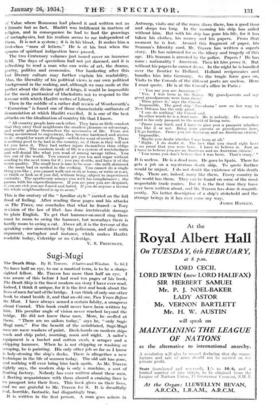Sugi-Mugi
The Death Ship. By B. Traven. (Cbetto and Windus. 7a. 6d.) To have half an eye, to use a nautical term, is to be a sharp- sighted fellow. Mr. Traven has more than half an eye. I was aware of this before I had read ten pages of his book. The Death Ship is the finest modern sea story I have ever read. Indeed, I think it unique, for it is the first real book about the lives of men for'ard of the bridge. I can think of only one other book to stand beside it, and that an old one, Two Years Before the Mast. I have always sensed a certain falsity, a smugness about Conrad. This book could never have been .written by him. His peculiar angle of vision never reached beyond the bridge. He did not know these men. More, he scoffed at them. "There are no sailors today," says he, " only Sugi-- Mogi men." Fair the benefit of the uninitiated, Sugi-Mugi men arc mere washers of paint. Deck-hands on modern ships wash and chip paint, morning, noon and night. A sailor's equipment is a bucket and cotton swab, a scraper and a chipping hammer. When he is not chipping or washing or scraping, he is painting. His only other job so far as I know is holy-stoning the ship's decks. There is altogether a new technique in the life of seamen today. The old salt has gone, and nothing will ever bring him back again. As Mr. Traven rightly says, the modern ship is only a machine, a sort of floating factory. Nobody has ever written about these men. A fleeting acquaintance with them aboard a cruising. liner is no passport into their lives. This book gives us their lives, and we are grateful to Mr. Travel for it. It. is dreadfully. Teal, horrible, fantastic, but disgustingly true.
It is .Written in the first person,. A man. goes ashore in
Antwerp, visits one of the many dives there, has a good time and sleeps too long. In the morning. his ship has sailed without him. But with his ship has gone his-life, for it has taken his clothes, his money and his papers. From that moment he- is lost. Around this fragment of paper, his Seaman's Identity card, Mr. Traven has written a superb story. He has mirrored for us the idiocy and tragedy of this age. His Seaman is arrested by the police. Papers ? He has none : nationality ? American. Then let him prove it.. But without his papers he cannot do so. In the night he is bundled over the frontier to Holland. Holland 'reciprocates and bundles hint into Germany. So the tragic farce goes on, Visits to the Consuls of the different ports are useless. Here I must quote. He is at the Consul's office in Paris : " You say you arc American ? '
Yea. I was born in the State::. My grandparents and my great grandparents were born there.'
• Then prove it,' says the Consul.
Impossible. The good ship "Tuscaloosa' now on her way to New Orleans has the only proof. I can do nothing,' the Consul said.
In other words he is a dead man. He is nobody. His seamatia card is his only passport to the world of living men.
' Prove your birth and I have to give you a passport whether you like it or not. Bring your parents or grandparents here. rll go further. Provo you are American and an American citizen.'
Impossible.
' Maybe you doubt whether I was born at all.'
` Right. I do doubt it. The feet that you stand right hers is no proof that you were born. I have to believe it. Just as 1 have to believe you are an American and an American citizen.' ' You mean you don't believe that I was born. That's crazy.' "
It is useless. He is a dead man. lie goes to Spain. There he gets a job on a mysterious death ship. To quote further would be unjust. I do not doubt the existence of this death- ship. There arc, indeed, many like them. Every country in the world has them. They can he found on some of the most respectable trade routes. But it is the first time they have ever been written about, and Mr. Traven has done it magnifi- cently. No better description of a_ ship's stokehold and the strange beings in it has ever come my way.
JAMES HANLEY.










































 Previous page
Previous page